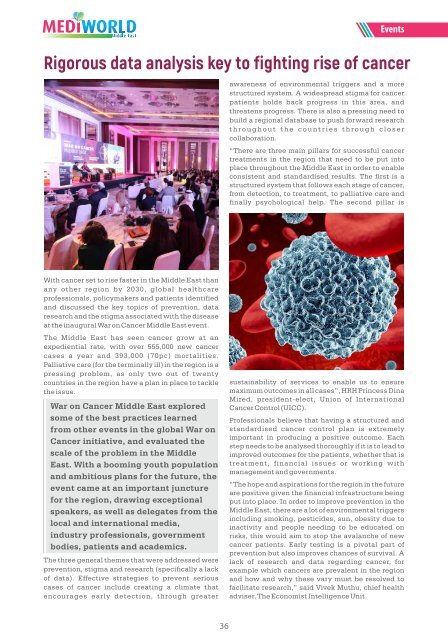You also want an ePaper? Increase the reach of your titles
YUMPU automatically turns print PDFs into web optimized ePapers that Google loves.
Events<br />
Rigorous data analysis key to fighting rise of cancer<br />
awareness of environmental triggers and a more<br />
structured system. A widespread stigma for cancer<br />
patients holds back progress in this area, and<br />
threatens progress. There is also a pressing need to<br />
build a regional database to push forward research<br />
t h r o u g h o u t t h e c o u n t r i e s t h r o u g h c l o s e r<br />
collaboration.<br />
“There are three main pillars for successful cancer<br />
treatments in the region that need to be put into<br />
place throughout the Middle East in order to enable<br />
consistent and standardised results. The first is a<br />
structured system that follows each stage of cancer,<br />
from detection, to treatment, to palliative care and<br />
finally psychological help. The second pillar is<br />
With cancer set to rise faster in the Middle East than<br />
any other region by 2030, global healthcare<br />
professionals, policymakers and patients identified<br />
and discussed the key topics of prevention, data<br />
research and the stigma associated with the disease<br />
at the inaugural War on Cancer Middle East event.<br />
The Middle East has seen cancer grow at an<br />
expediential rate, with over 555,000 new cancer<br />
cases a year and 393,000 (70pc) mortalities.<br />
Palliative care (for the terminally ill) in the region is a<br />
pressing problem, as only two out of twenty<br />
countries in the region have a plan in place to tackle<br />
the issue.<br />
War on Cancer Middle East explored<br />
some of the best practices learned<br />
from other events in the global War on<br />
Cancer initiative, and evaluated the<br />
scale of the problem in the Middle<br />
East. With a booming youth population<br />
and ambitious plans for the future, the<br />
event came at an important juncture<br />
for the region, drawing exceptional<br />
speakers, as well as delegates from the<br />
local and international media,<br />
industry professionals, government<br />
bodies, patients and academics.<br />
The three general themes that were addressed were<br />
prevention, stigma and research (specifically a lack<br />
of data). Effective strategies to prevent serious<br />
cases of cancer include creating a climate that<br />
encourages early detection, through greater<br />
sustainability of services to enable us to ensure<br />
maximum outcomes in all cases”, HRH Princess Dina<br />
Mired, president-elect, Union of International<br />
Cancer Control (UICC).<br />
Professionals believe that having a structured and<br />
standardised cancer control plan is extremely<br />
important in producing a positive outcome. Each<br />
step needs to be analysed thoroughly if it is to lead to<br />
improved outcomes for the patients, whether that is<br />
treatment, financial issues or working with<br />
management and governments.<br />
“The hope and aspirations for the region in the future<br />
are positive given the financial infrastructure being<br />
put into place. In order to improve prevention in the<br />
Middle East, there are a lot of environmental triggers<br />
including smoking, pesticides, sun, obesity due to<br />
inactivity and people needing to be educated on<br />
risks, this would aim to stop the avalanche of new<br />
cancer patients. Early testing is a pivotal part of<br />
prevention but also improves chances of survival. A<br />
lack of research and data regarding cancer, for<br />
example which cancers are prevalent in the region<br />
and how and why these vary must be resolved to<br />
facilitate research,” said Vivek Muthu, chief health<br />
adviser, The Economist Intelligence Unit.<br />
36

















